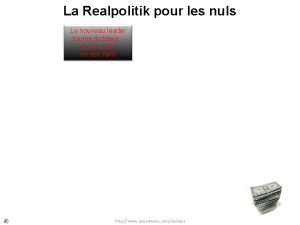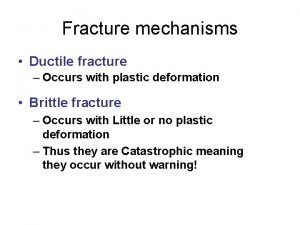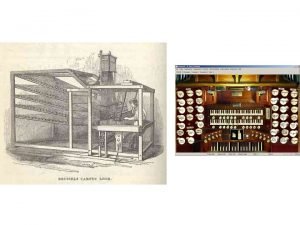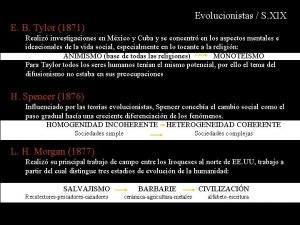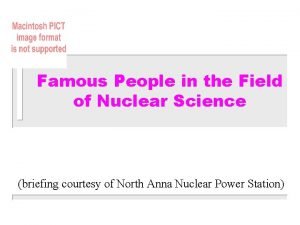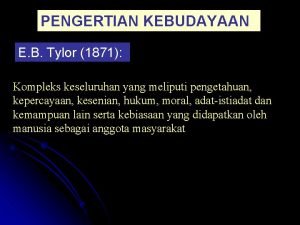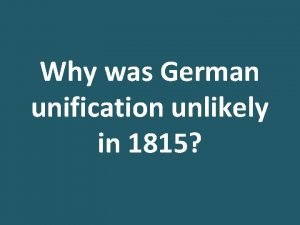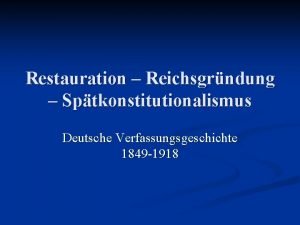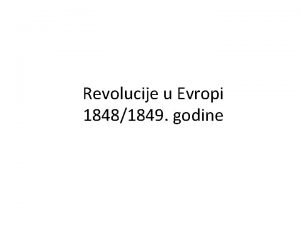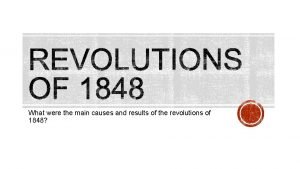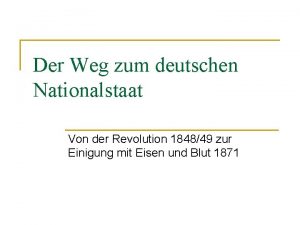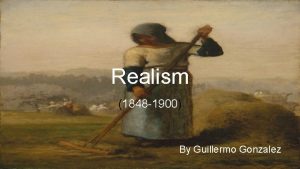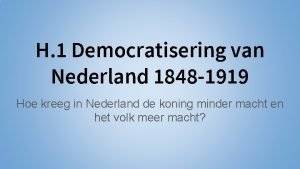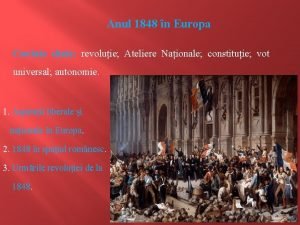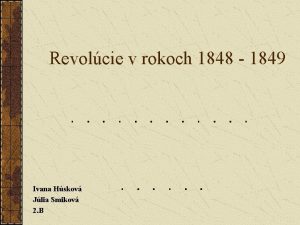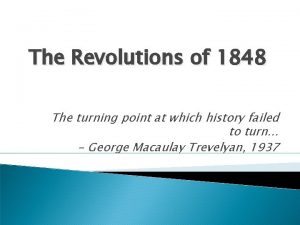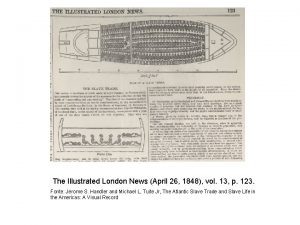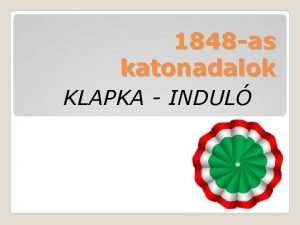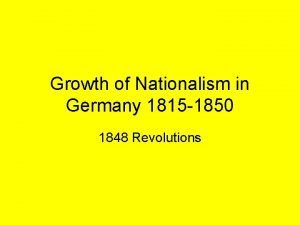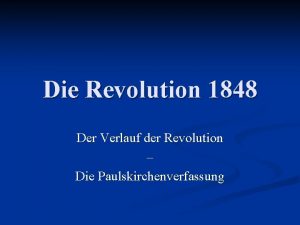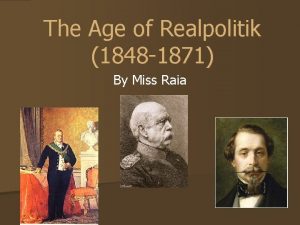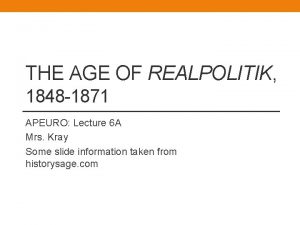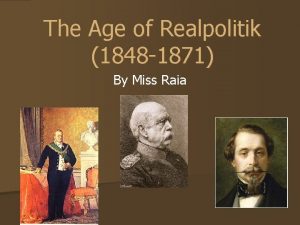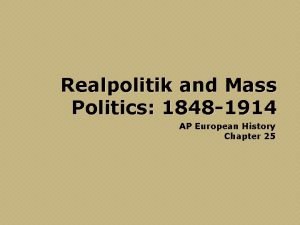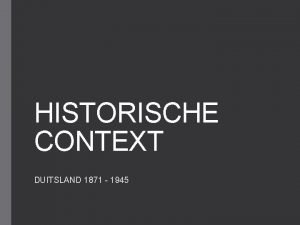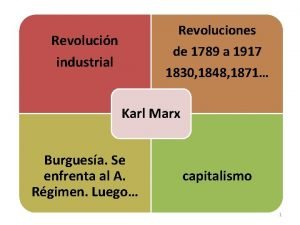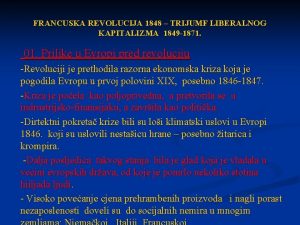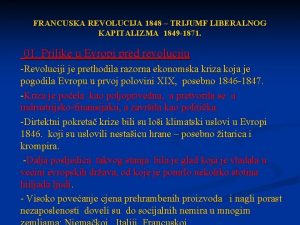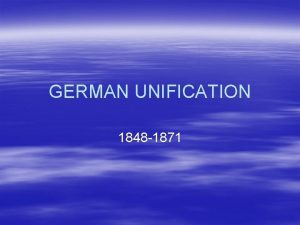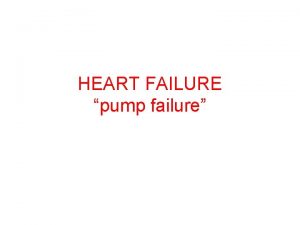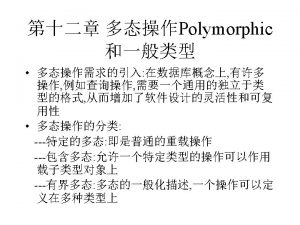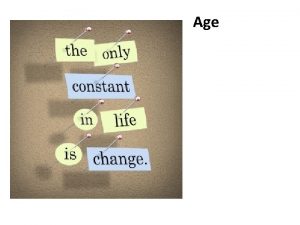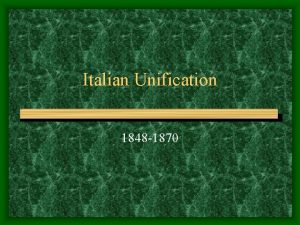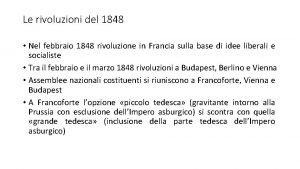The Age of Realpolitik 1848 1871 Failure of


























- Slides: 26

The Age of Realpolitik 1848 -1871

Failure of the Revolutions of 1848 • Germany: • Nationalists and liberals of the Frankfurt Parliament failed to get the support of Prussian king Frederick William IV for a unified Germany. • Frederick William refused to “accept the crown from the gutter” and instead claimed Frederick “divine right. ” • Italy: • The failure of Italian revolutionaries to work together effectively resulted in Austria and France forceful taking back control over Italy. • Austria (Hapsburg) Empire: • Minority groups failed to gain a foothold

• France: • The February Revolution resulted in the overthrow of King Louis Philippe and established the Second French Republic led by Alphonse Lamartine. • The “June Days” Revolution pitted the bourgeoisie against the working class and conservatives (supported by the army) restored order. • Louis Napoleon (a conservative) was elected president overwhelmingly

Emergence of Realpolitik after 1848 • For liberals and romantics strong idealism was not enough to accomplish revolutionary goals. • The “age of Realism” replaced Romanticism as the dominant philosophy after 1850. • A political outgrowth of realism was the notion of Realpolitik: the accomplishing of one’s political goals via practical means (rather than having idealism drive political decisions). • A new political era emerged where nationalist goals were achieved step-by-step in Machiavellian fashion (e. g. German unification, Italian unification, and Hungarian autonomy)/ • In France, emperor Napoleon III (Louis Napoleon) would have to cater to liberals in order to maintain effective control.

Crimean War (1853 -1856) • Symbol of the failure of the Concert of Europe • Between 1848 and 1878 peace in Europe would be interrupted by several wars • Major Cause: • dispute between two groups of Christians over privileges in the Holy Land (Palestine) (Roman Catholics v. Eastern Orthodox) • Russia occupied Turkish controlled land along the Danube River • The Ottoman Empire declared war on Russia in 1853 when Nicholas

• In 1854, Britain and France declared war against Russia. • To some this was a major surprise as the Turks were not Christians, yet were supported by Britain and France who were Christian countries. • The “Four Points” included the following provisions: • Russia had to renounce claims to the occupied principalities on the Danube. • Navigation in the mouth of the Danube River (on the Black Sea) was internationalized. • Russia had to renounce its special role of protecting Greek Orthodox Christians within the Ottoman Empire.

• Austria agreed to the “Four Points” and gave Russia an ultimatum to comply or Austria would join the war. • The new tsar, Alexander II, agreed to accept the Four Points and end the war.


Fighting The War • Most of the war was fought on the Crimean peninsula in the Black Sea. • Over 50, 000 British and French troops fought in the Crimea against Russian forces, seeking to take the Black Sea port city of Sebastopol. • Florence Nightingale (1820 -1910) • British nurse who became a pioneer in modern nursing • During the Crimean War more men died of disease rather than by combat wounds. • Nightingale’s “Light Brigade” superbly tended to wounded men during the war, although fatalities due to disease remained high.


Peace of Paris • Russia emerged as the big loser in the conflict. • Russia no longer had control of maritime trade on the Danube • had to recognize Turkish control of the mouth of the Danube • renounced claims to Moldavia and Wallachia (which later became Romania). • Aftermath • Russia was shocked that it had fallen so far behind in military power. • Russia began its move toward industrialization and modernization of its army.

Second French Republic (1848 -1852) • Constitution: unicameral legislature (National Assembly); strong executive power; popularly-elected president • Universal male suffrage • President Louis Napoleon • He was dedicated to law and order, opposed to socialism and radicalism, and favored the conservative classes—the Church, army, property-owners, and business. • In return for the support of conservatives, Louis Napoleon had to make concessions.

• Concessions • Falloux Laws: Louis Napoleon returned control of education to the Church (in return for its support). • He minimized influence of the Legislative Assembly. • He supported policies favorable to the army. • He disenfranchised many poor people from voting. • He destroyed the democratic-socialist movement by jailing or exile its leaders and closing down labor unions. • The National Assembly did no grant Louis a second term • He decides to plot a coup and declare himself emperor


The Second French Empire (Liberal Empire ) • Napoleon III took control of the gov’t in coup d’etat (December 1851) and became emperor the following year. • He restored universal suffrage in 1852 and 92% of the people voted to make him president for 10 years. • France was the only country in Europe at that time to provide universal suffrage. • 1851 -1859: Napoleon III’s control was direct and authoritarian. • 1859 -1870: Napoleon III set out to build the “liberal empire” by initiating a series of reforms

Reforms Under Napoleon III • Economic reforms resulted in a healthy economy. • Railroads, canals, and roads • Movement towards free trade • Political reforms • Napoleon III extended the power of the Legislative Assembly. • He returned control of secondary education to the government (instead of the Catholic Church). • He permitted trade unions and their right to strike (1864). • He eased censorship and granted amnesty to political prisoners.

Failures of Napoleon III • Napoleon III was not skilled in foreign policy • His involvement in the Crimean War angered many republicans and Liberals alike • He had issues in French colonies of Algeria and Indochina • French intervention in Mexico became a hotly debated topic (lead to the Second Mexican Empire) • The Franco-Prussian War (1870 -71) and capture of Napoleon III resulted in the collapse of the Second French Empire.

Italian Unification • After collapse of the Revolutions of 1848 -49, the unification movement in Italy shifted to Sardinia-Piedmont under King Victor Emmanuel, Count Cavour and Garibaldi. • Count Camillo Benso di Cavour (1810 -1861) of Sardinia-Piedmont led the struggle for Italian unification. • He served as King Victor Emmanuel’s prime minister between 1852 and 1861. • He guided Sardinia-Piedmont into a liberal and economically viable state. • Molded after the French constitution of 1830 • Cavour sought unity for the northern and central areas of Italy. • Obtained through war with Austria and negotiations with Napoleon III

• Giuseppe Garibaldi (1807 -1882) liberated southern Italy and Sicily. • In May 1860, Garibaldi and his thousand Red Shirts landed in Sicily and extended the nationalist activity to southern Italy. • By September, Garibaldi took control of Naples and the Kingdom of the Two Sicilies. • Although Cavour distrusted Garibaldi, Victor Emmanuel II encouraged Garibaldi’s exploits in the south of Italy. • Garibaldi thus allowed his conquests to be absorbed into Sardinia. Piedmont • In February 1861, Victor Emmanuel was declared King of Italy and presided over an Italian Parliament which represented all of Italy except for Rome and Venice • Venice was added in 1866 and Rome in 1871


German Unification • German unification was primarily orchestrated by the Hohenzollern family (Dukes of Prussia) • Kleindeutsch plan": The idea for a unified Germany without Austria was seen as the most practicable means of unification among various German states, particularly Prussia. • Otto von Bismarck (1810 -1898) led the drive for a Prussian-based Hohenzollern Germany. • Junker background; obsessed with power • "Gap theory" gained Bismarck's favor with the king. • Since the king had granted the constitution, Bismarck insisted he ignore liberals (middle class) in the legislature and follow his own judgment. • “The great questions of the day will not be decided by speeches and resolutions—that was the blunder of 1848 and 1849—but by blood and iron. ”

• Between 1863 and 1866 Germany fought two wars with Denmark and Austria in order to gain territory • Much of Germany was unified after the 1866 defeat of Austria • In 1867, the North German Confederation was established by Bismarck with King William I as president. • It included all the German states except Baden, Wurttemberg, Bavaria, and Saxony. • The parliament (Reichstag) consisted of two houses that shared power equally. • The upper house (bundesrat) included representatives from each state. • The lower house (bundestag) had representatives elected by universal male suffrage


Franco-Prussian War (1870 -1871) • Bismarck sought to provoke a war with France in order to further unify Germany and annex Alsace and Lorraine. • Thus, Bismarck boasted that a French diplomat had been kicked out of German • An infuriated France declared war against Germany. • Bismarck used the war with France to bring the four remaining southern German states into the North German Confederation • Paris fell to the Germans in January, 1871: Napoleon III was captured. • Treaty of Frankfurt (May 1871): Alsace and Lorraine were ceded to Germany. • The German Empire was proclaimed on January 18, 1871 (Germany was now the most powerful nation in Europe).


The Austro-Hungarian Empire • Austria’s defeat by Germany in 1866 weakened its grip on power and forced it to make a compromise and establish the so-called dual monarchy. • Ausgleich (or Compromise), 1867 • Officially created the Austro-Hungarian Empire • Hungarians now had their own assembly, cabinet, and administrative system, and would support and participate with Austria in the Imperial army and in the Imperial gov’t. • Results • Austria assimilated the Hungarians (Magyars) and nullified them as a primary opposition group. • It also led to more efficient gov’t.
 Otto von bismarck practiced realpolitik which was
Otto von bismarck practiced realpolitik which was Realpolitik
Realpolitik Capture beat
Capture beat Failure to sense
Failure to sense Brittle fracture examples
Brittle fracture examples Iron age dates
Iron age dates Iron age bronze age stone age timeline
Iron age bronze age stone age timeline Charles babbage gay
Charles babbage gay Tylor evolucionismo
Tylor evolucionismo 1937-1871
1937-1871 Continental 1871
Continental 1871 Pengertian kebudayaan menurut e.b taylor
Pengertian kebudayaan menurut e.b taylor Germany before 1871
Germany before 1871 Verfassung 1871
Verfassung 1871 1848 revolution germany
1848 revolution germany Revolucija u italiji 1848
Revolucija u italiji 1848 Austrian empire 1848
Austrian empire 1848 Norddeutscher bund
Norddeutscher bund Realism (1848–1900)
Realism (1848–1900) Willem i
Willem i Anul 1848 in europa
Anul 1848 in europa Francúzska revolúcia 1848
Francúzska revolúcia 1848 Austroslavism
Austroslavism Illustrated london news 1848
Illustrated london news 1848 48 as katonadalok
48 as katonadalok Humiliation of olmutz
Humiliation of olmutz Revolution 1848 verlauf
Revolution 1848 verlauf

